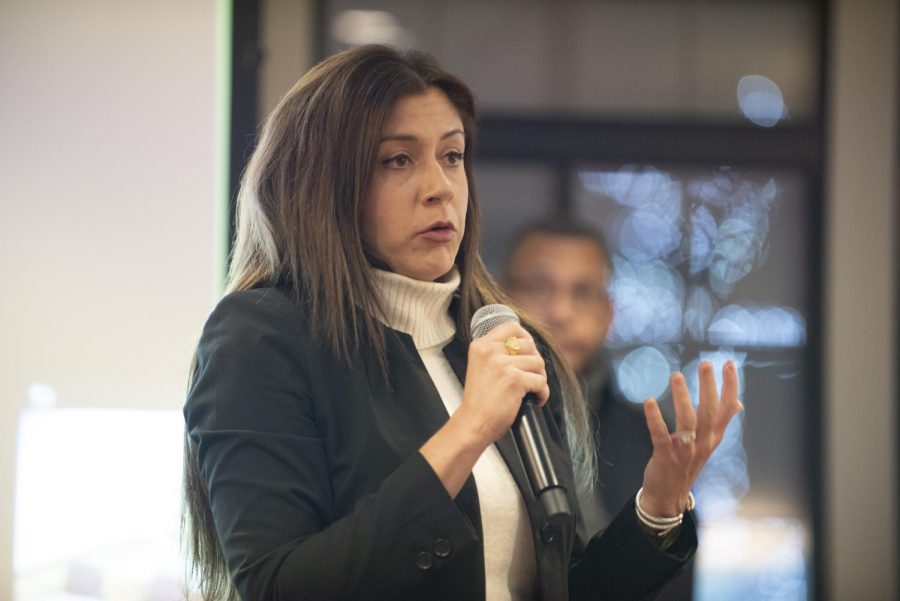Office of Equity talks changes to Title IX policy at October Faculty Senate meeting
Daily file photo by Colin Boyle
Sarah Wake speaks to Faculty Senate in 2018 about proposed Title IX rules by the U.S. Department of Education. Those rules went into effect Aug. 14.
October 15, 2020
Northwestern’s Faculty Senate discussed changes to the University’s Title IX policy at its Wednesday evening meeting, laying out how the Trump administration’s guidelines will impact the process through which complaints from students, faculty and staff are handled.
The Trump administration’s changes to Title IX — which broadly bar gender discrimination in federally-funded schools — implement more restrictive legal rules for how educational institutions have to respond to reports of violations and sexual misconduct (including dating violence, domestic violence, stalking and sexual assault).
These include requiring a complainant to prove harassment was “severe,” “pervasive” and “objectively offensive,” a cross-examination of the accuser by the accused and vice versa, and a mandate that everything discovered in an investigation be shared.
Sarah Wake, associate general counsel, explained the implications of these changes.
“The most impactful thing that these regulations did is change the definition of sexual harassment,” Wake said.
Wake said the policy now asserts that Title IX can only apply to sexual harassment that occurs in the United States and within a building or unit under the jurisdiction of the University — meaning NU would not be responsible for any violations to or by a student, faculty or staff member off campus or abroad.
Colleen Johnston, director of Sexual Misconduct Response and Resources, noted following this policy alone would ultimately eliminate an avenue for people to report violations.
“When we’re thinking of things like sexual assault, stalking, those types of behaviors, often, some of those allegations involve off-campus conduct,” Johnston said. “It’s really hard to say without combing through each report to see exactly where the allegations occurred, but there is a fair amount of sexual misconduct that comes to my office that is typically occurring off campus.”
n codifying these new regulations, the U.S. Department of Education said schools could develop their own policy to address situations that are outside the jurisdiction of the new Title IX regulations. With that discretion, Wake said the Office of General Counsel, the Office of Equity and the Faculty Senate worked through the summer to craft and implement new University policies that would satisfy the government’s legal changes while accounting for its restrictions.
The result was two new policies on handling sexual harassment and assault: an Interim Policy on Title IX Sexual Harassment, which satisfies the government’s guidelines, and a Policy on Institutional Equity, which will govern all other incidents of discrimination, harassment and sexual assault. Both went into effect on Aug. 14.
TiShaunda McPherson, associate vice president for equity, compared the two policies for Senate members.
On a jurisdictional front, the Title IX policy would govern conduct of quid pro quo sexual harassment by an employee and instances of sexual harassment as defined under the Clery Act and the Violence Against Women Act. On the other hand, the Policy on Institutional Equity — a hybrid of the University’s previous Policy on Discrimination and Harassment and Policy on Sexual Misconduct — is much broader.
“Part of the reason why we wanted to make sure that we had the Policy on Institutional Equity is to ensure that (NU can govern) any allegations of misconduct or behavior that impacts our Northwestern community,” McPherson said. “Whether that’s in Doha or whether that’s during remote learning and individuals are in a variety of places.”
The University’s policy also places no restriction on the complainants’ affiliation with the University, whereas the Title IX policy requires that the complainant must be participating in one or more of the “University’s Education Programs or Activities” at the time they submit the complaint, and must submit it formally.
McPherson said once a complaint reaches the Office of Equity, it will be reviewed to determine whether it falls under the Interim Title IX policy or the Policy on Institutional Equity. She added parties do not have an option in choosing which policy governs the misconduct — it is solely up to the Office of Equity to determine.
Political science Prof. Karen Alter asked whether the new Title IX procedural elements could have a “chilling effect” on willingness to file a complaint.
Atler added that despite a preference for their complaint to be handled under the Policy on Institutional Equity over the DOE’s regulations, a student’s inability to choose that policy may further that chilling effect. She then asked whether students, faculty, staff and administration should be concerned.
Stephanie Graham, vice president and general counsel, responded bluntly: “Yes.”
Graham said she has personally seen this chilling effect occur as a result of the regulations, asserting the University will apply the Title IX policy only where they “absolutely have to, to the actions that (they) have to apply it to.”
“We are very concerned, and everyone across the country is very concerned. And you’re right — we don’t have a choice, and that is exactly why we have two policies,” Graham said. “If these (Title IX regulations) stay in effect, we’re going to really have to see… how else we can work through these issues without going back on the 10 years of progress that we’ve made in this area.”
Email: [email protected]
Twitter: @daisy_conant












